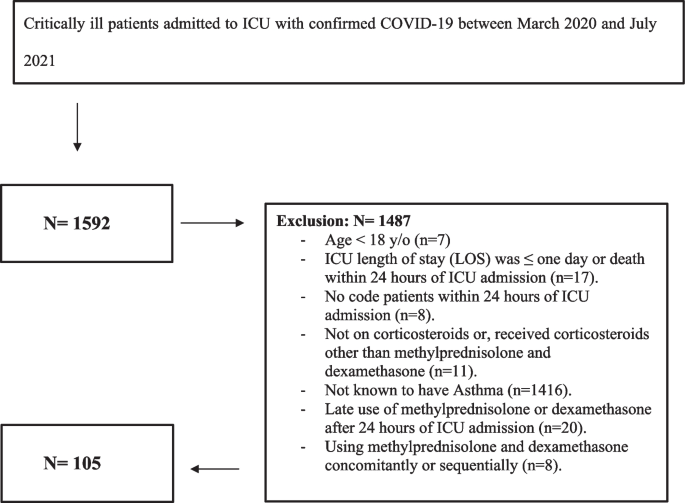Research – Open Access
Khalid Al Sulaiman, Ohoud Aljuhani, Ghazwa B. Korayem, Ali Altebainawi, Reham Alharbi, Maha Assadoon, Ramesh Vishwakarma, Nadia H. Ismail, Asma A. Alshehri, Faisal E. Al Mutairi, Mashael AlFaifi, Abdullah F. Alharthi, Abeer A. Alenazi, Mai Alalawi, Omar Al Zumai, Hussain Al Haji, Sarah T. Al Dughaish, Abdulrahman S. Alawaji, Haifa A. Alhaidal & Ghassan Al Ghamdi
BMC Pulmonary Medicine volume 23, Article number: 315 (2023)
Abstract
Background
Previous studies have shown mortality benefits with corticosteroids in Coronavirus disease-19 (COVID-19). However, there is inconsistency regarding the use of methylprednisolone over dexamethasone in COVID-19, and this has not been extensively evaluated in patients with a history of asthma. This study aims to investigate and compare the effectiveness and safety of methylprednisolone and dexamethasone in critically ill patients with asthma and COVID-19.
Methods

The primary endpoint was the in-hospital mortality. Other endpoints include 30-day mortality, respiratory failure requiring mechanical ventilation (MV), acute kidney injury (AKI), acute liver injury, length of stay (LOS), ventilator-free days (VFDs), and hospital-acquired infections. Propensity score (PS) matching, and regression analyses were used.
Results
A total of one hundred-five patients were included. Thirty patients received methylprednisolone, whereas seventy-five patients received dexamethasone. After PS matching (1:1 ratio), patients who received methylprednisolone had higher but insignificant in-hospital mortality in both crude and logistic regression analysis, [(35.0% vs. 18.2%, P = 0.22) and (OR 2.31; CI: 0.56 – 9.59; P = 0.25), respectively]. There were no statistically significant differences in the 30-day mortality, respiratory failure requiring MV, AKI, acute liver injury, ICU LOS, hospital LOS, and hospital-acquired infections.
Conclusions
Methylprednisolone in COVID-19 patients with asthma may lead to increased in-hospital mortality and shorter VFDs compared to dexamethasone; however, it failed to reach statistical significance. Therefore, it is necessary to interpret these data cautiously, and further large-scale randomized clinical trials are needed to establish more conclusive evidence and support these conclusions.
